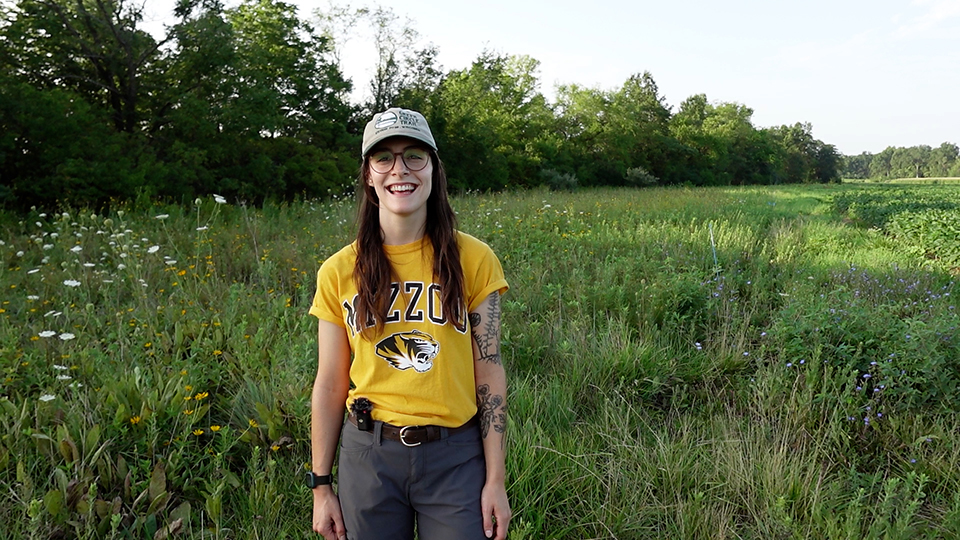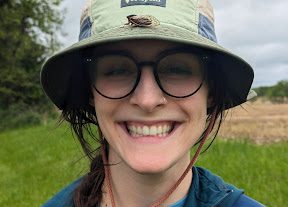Published on
Updated on

A graduate student in CAFNR’s Division of Plant Science and Technology has received an award from the North Central Region-Sustainable Agriculture Research and Education grant program of the USDA to identify companion plant species mixtures that promote insect pollination and natural pest control in Midwestern pepper crops
Leah Gastonguay, Ph.D. student in Plant, Insect and Microbial Sciences (Entomology program area), along with her advisor, Debbie Finke, professor of Plant Science and Technology, was awarded $19,792 for the project, “Companion Planting to Optimize Beneficial Insect Ecosystem Services in Pepper Cropping Systems.”
Gastonguay is part of Finke’s Insect Ecology Lab, studying how the ecosystem services of beneficial insects can enhance the sustainability of crop ecosystems.
Broadly, she is interested in making agriculture more sustainable by incorporating habitat for beneficial insects.
“Through biodiverse plantings, we can attract pollinators to pollinate the crops,” Gastonguay said. “This is also a natural way to attract predators of pests.”
One of her current graduate research projects is focused on determining what species of companion plants – plants solely for the purpose of attracting beneficial insects – attract insect pollinators and natural enemies of pests to peppers. She said she chose peppers as they are the second-most grown horticulture crop in Missouri, as well as being fun to grow.
Gastonguay’s research wasn’t yielding a lot of data though, as she performs timed visual observations of the plants to document insect visitations to the companion and pepper plants.

“But you can only sit in front of the plants for so long! It takes a lot of manpower,” she said.
The grant will allow her to purchase cameras to record the plants’ insect activity, in addition to allowing her project to grow in scope through rented farmland in addition to her plots at CAFNR’s South Farm, part of the Central Missouri Research, Extension and Education Center.
Her partners include Earthdance Organic Teaching Farm in Ferguson and the Columbia Center for Urban Agriculture; she is also working with advisors Liz Graznak of Happy Hollow Farm in Jamestown, and Emily Wright of Three Creeks Farm + Forest in Ashland. The advisors will help Gastonguay make certain the project is relevant to farmers.
CAFNR Center for Regenerative Agriculture’s Rob Myers and Kelly Wilson, respectively a member of Gastonguay’s Ph.D. committee and a former professor of hers, encouraged her to apply for the grant, in addition to Finke. She worked with the CAFNR Grants Office to get everything submitted for her funding application.
“I’m really fortunate to have a lot of great mentors in my life,” Gastonguay said.
Gastonguay wasn’t sure what she wanted to do after graduating with her undergraduate degree in biology during covid. The job market “was looking bleak,” she said, and she was soon inspired by her professors in Wisconsin to pursue a graduate degree.
“I wanted to be just like them, basically,” she said. “They are amazing!”
She started researching graduate programs, and found Finke, her now advisor. She also toured Mizzou and liked what she saw.
She started her undergraduate degree program as a pre-med student, but when she took her first college biology class, which was required for pre-med, she realized she really loved that field.
“It’s crazy how everything interacts in the environment,” she said. “After that class I changed my major and immersed myself in it.” At the same time, Gastonguay started working in the university conservatory, where she found she really enjoyed working with the plants.
Even though her project is focused on pepper cropping systems specifically, it has implications for all Midwest-cropping systems, she said. This grant was awarded as part of NCR-SARE’s 2024 Graduate Student Grant Program, a competitive grant program to fund graduate student projects that address sustainable agriculture issues. Funding considerations are made based on how well the applicant articulates the nature of the research and education components of their sustainable agriculture grant proposals.
NCR-SARE’s Administrative Council (AC) members decide which projects will receive SARE funds. A collection of farm and non-farm citizens, the AC includes a diverse mix of regional agricultural stakeholders. Council members hail from regional farms and ranches, the Cooperative Extension Service, universities, federal agencies and nonprofit organizations.
Learn more about NCR-SARE’s Graduate Student Grant Program online.